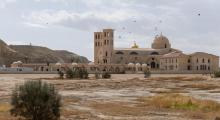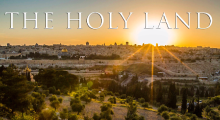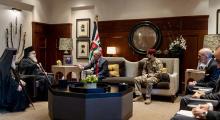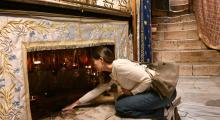Issued by the Catholic Center for Studies and Media - Jordan. Editor-in-chief Fr. Rif'at Bader - موقع أبونا abouna.org
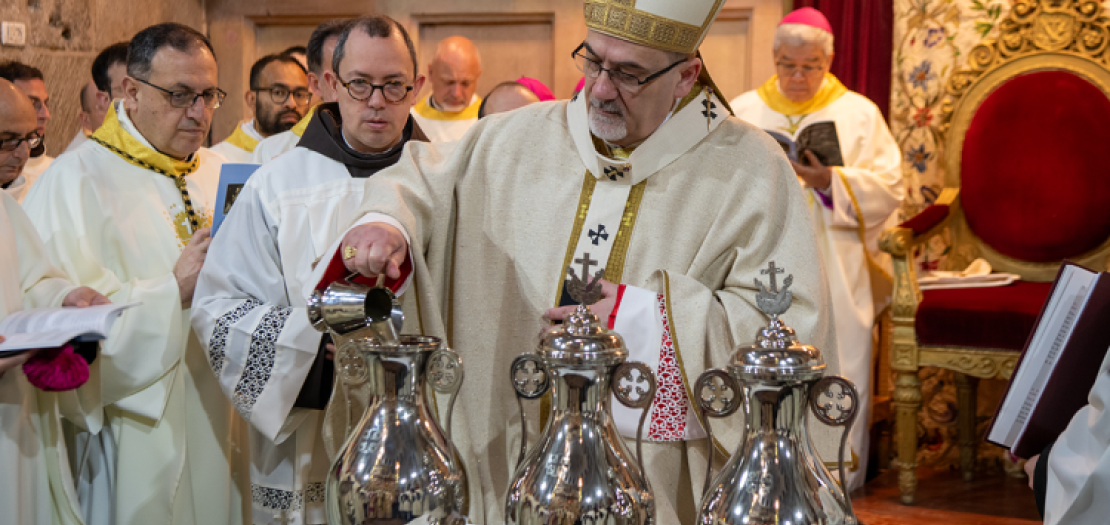
Following is the text of the Maundy Thursday Homily by His Beatitude Cardinal Pierbattista Pizzaballa, Latin Patriarch of Jerusalem, at the Holy Sepulcher, in Jerusalem, dated April17, 2025:
Dear brothers and sisters,
bishops, priests, seminarians, religious men and women religious, faithful and pilgrims,
may the Lord give you peace!
We are gathered today for the annual commemoration of Christ’s Passover, right here where it was fulfilled. In the mysteries of Maundy Thursday, which we celebrate, it is like an anticipation and summary. Here is revealed to us the deepest desire of Jesus, the intention that inspired Him in the days of His passion, His way of being in the world in order to save it.
As far as possible, I would like you to join me in putting ourselves in His school, the school of the Upper Room, to learn from Jesus the style of the disciple, to try to be, in this world of ours, instruments of salvation. In fact, I am convinced that the mission of the Church and its members, despite the diversity of ministries and charisms, is essentially one and the same: to contribute, with the grace of the Holy Spirit, to the salvific encounter of humanity with the Passover of Christ. Indeed, the sacrament of baptism and ordination have made us co-workers with God.
- The first thing one learns in the Upper Room is an awareness. In the Passion narratives, it is striking that “Jesus knows...” (cf. Jn 13:3; 18:4; 19:28). The Lord is not distracted, he is not confused, he is not caught up in a superficial or inadequate view of events. He knows the sin of the people, He recognises the hour of darkness, He knows about the fear and weakness of the disciples. But he also knows that the Father is with Him; He does not forget the Kingdom; He is not resigned to the inevitable. He lives his hour with great hope, which is not naïve optimism, but a deep trust that the darkness cannot defeat the light.
Here I wish we could live our present, which is so dark and complicated, in this way. The evil we experience is real, the pain of our people is deep, the injustice that oppresses us is heavy. And we must not be afraid to acknowledge and denounce it. But we know with Jesus that these are not the last words about history and life. In this jubilee of hope, we recognise with renewed certainty that God is with us and opens in the desert mysterious paths to the coming Kingdom. I ask the Lord for myself and for you, that the oil of the catechumens will awaken this prophetic capacity in our Church. It is not about guessing the future or orienting ourselves to the predictions of the world, which are punctually denied. It is about standing in reality with the “more” of vision that comes to us from trust in God and from hope in His kingdom.
- The second thing we learn in the Upper Room is to stand up, to decide: “Jesus, fully aware that... rose from...” (John 13:3). This knowledge of Him will inspire the decisions he will make on the most dramatic and painful night of His earthly life.
That night he decided to wash the feet of his disciples, to institute the Eucharist, to choose the Apostles again as his friends. In other words, he decided to open a path to the future and to do so, thanks to a deeper act of giving. On that evening, the Master establishes a new alliance, which no longer consists of the simple observance of the law, but of the “more” of self-giving love.
This time of ours is hungry. Our Holy Land is hungry. In some parts of our country, it is even hungry in the truest sense of the word. It is not only deprived of its dignity but also of its daily bread, its earthly bread. But more than that, we are hungry for the bread that Jesus gives us today, which is Himself, who offers Himself for our redemption. Perhaps we are more tired and exhausted today than ever before, perhaps even disappointed and hurt by so much pain and violence, unable to look forward with confidence. But can the earthly bread, the justice of men, the logic of power, of yesterday and today, ever satisfy our hunger for freedom, justice and dignity? That is not what our hope is based on.
We believe, and today in this solemn liturgy we affirm once again that we want to build our lives on the rock of Christ, and make His invitation to follow him our own, to make His same attitude our own (cf. Phil 2:5; 1 Pet 4:1). Earthly bread is not enough for us, we need the bread of life so that it renews in us the longing for life, gives us the joy of continuing to serve, to offer, to give our lives with love and without fear. We are hungry for justice, that is true. But not for the justice of men, which is always lacking, which always disappoints, and which will always make us hungry. We long for the justice that flows from the heart of Jesus, from His self-giving on the cross, which is an excess, a “more” of love and forgiveness. For it is in the heart of the crucified Jesus that justice and forgiveness meet and embrace each other. It is not in obedience to people, but in trusting obedience to God the Father, even to the point of the cross, that Jesus preserves and gives us true freedom, the freedom of the children of God. With justice alone, with condemnation alone, one remains stuck in the past and does not build a future. Only love builds.
This divine justice needs people today who, like Jesus, are prepared to pay for it themselves. It needs our hearts, our self-giving, our ability to lose everything, even our lives, so that the world can come to know true life, encounter true justice and love, freedom from the logic of man and power, which only originates in God.
Therefore, I ask the Lord that the chrism that makes us all people of the new covenant and makes us, the ordained ministers, servants of a greater love, may create in us a new capacity to love and serve, to give and forgive, to cultivate the desert and make the justice of the Kingdom truly flourish.
- The third thing we learn in the Upper Room is to console. Jesus decided that evening not to rebuke or defend Himself, but to accompany and console His disciples. The consolation that the Lord offers the disciples is certainly not a pat on the back. He promises them the Spirit. That is, He assures them that He will always be there. Insults and injustice, betrayal and abandonment will not destroy His friendship. To console means to decide to stay together despite everything. The resurrection is nothing other than this final, victorious decision. The joy of Easter is not the happy ending of fairy tales but the faithfulness of love, that endures and thus triumphs over evil and death. The sacraments that we celebrate and receive make us servants of this consolation. For me too, in these years of suffering, people have asked for affection, closeness and companionship more than anything else. I almost have the feeling that those who are suffering need not only bread, but also love. This time demands from us a new capacity for closeness.
Therefore, I pray to the Lord for me and for you, that the oil of the sick may comfort our wounds, make us overcome the fear of evil and death, and encourage us to stand by our people and this land with a faithfulness that is stronger than all difficulties.
Dear friends, let us go to the school of the cenacle. Let us learn and ask the Lord for the “more” of prophecy, of gift and witness that alone can give hope to our Church and to humanity. May the offered body and the shed blood of our Saviour make us capable of always living and acting in that love that conquers death and remains forever.
Therefore, let us not allow fear and resignation to slow down or stop the course of the Gospel in our country! Let us continue to distribute the bread of life to all with joy! Let us insist on building fraternal relationships and bonds of communion with one another and with all people! There is no night that love cannot illuminate, there is no failure that the cross cannot transform, there is no wound that Easter cannot transfigure! As the apostle says: “This saying is trustworthy: If we have died with him we shall also live with him; if we persevere we shall also reign with him” (2Tim 2, 11-12) and what today seem to us to be signs of the end will become, by His grace and faith, a prophecy of new beginnings!
Happy Easter, in the faith that believes all, in the hope that sees all, in the love that gives all!
+Pierbattista


